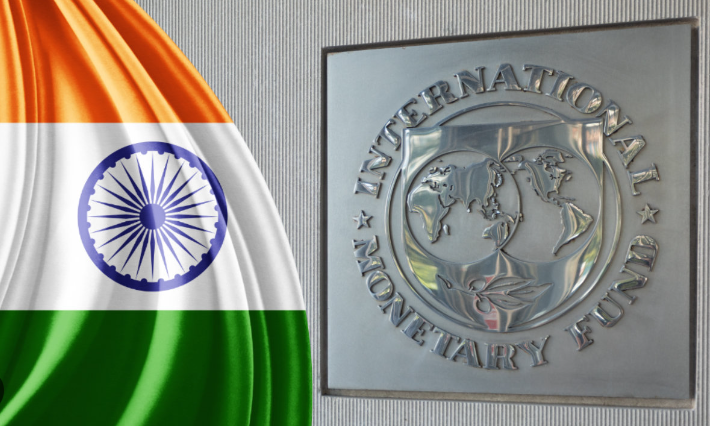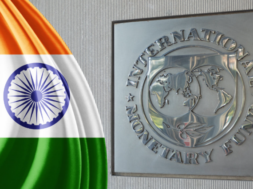
Reforms: IMF praises India, says it can contribute over 16% to global GDP
Virendra Pandit
New Delhi: Praising India’s near-term fiscal policy and its central bank’s proactive monetary policy actions, the International Monetary Fund (IMF) has said the South Asian nation is likely to contribute over 16% to the global GDP soon, the media reported on Tuesday.
In its annual Article IV consultation report on India, the global lender’s staff noted that its economy has shown “robust growth” in 2023 and is expected to remain strong, supported by macroeconomic and financial stability.
The IMF said the Indian financial sector has been resilient and largely unaffected by global financial stress in early 2023.
The Indian economy’s strong performance will likely continue and it has the potential to “grow faster and more sustainably if a comprehensive structural reform agenda is implemented.”
The tightening of the fiscal stance in 2023-24 is appropriate, it said, adding an ambitious medium-term consolidation plan is required to rebuild buffers and preserve debt sustainability.
“(IMF Executive) Directors welcomed the authorities’ near-term fiscal policy, which focuses on accelerating capital spending while tightening the fiscal stance,” the IMF’s Article IV consultation report, released on Tuesday, said.
New Delhi is looking to lower its fiscal deficit to 5.9 percent of GDP in the current financial year (2023-24), with the Centre confident about meeting the target. In the medium term, as the government remains “committed”, the fiscal deficit is expected to be lowered to 4.5 percent of GDP by 2025-26.
“The adjustment will be implemented approximately evenly over 2024-25 and 2025-26. State government deficits are expected to remain below the 3 percent of GDP ceiling, in line with their historical performance,” the IMF added.
However, India’s high public debt warranted additional revenue and expenditure measures, such as further Goods and Services Tax (GST) and subsidy reforms, with a continued focus on public investment and targeted support for the vulnerable.
On the growth front, the IMF expects the Indian economy to expand by 6.3 percent in the current and next year, 20 basis points lower than the government’s forecast of 6.5 percent. However, the government might raise its growth forecast for FY24 after the blockbuster GDP data for the July-September period, which has already led to the RBI raising its projection by 50 basis points to 7 percent.
The IMF might release its World Economic Outlook update in late January 2024.
Regarding inflation, the IMF noted that while the headline rate has been volatile, it has reduced, with the RBI’s policy tightening being effective in addressing the issue.
“(IMF Executive) Directors commended the RBI’s proactive monetary policy actions and strong commitment to price stability. They agreed that the current neutral monetary policy stance, anchored on a data-dependent approach, is appropriate and should gradually bring inflation back to target.”
The RBI’s Monetary Policy Committee (MPC) rapidly raised the policy repo rate by 250 basis points in FY23 to 6.5 percent to bring down multi-year high inflation following a surge in global commodity prices in the aftermath of Russia’s invasion of Ukraine in February 2022.
However, with food prices remaining volatile because of multiple supply-side shocks, the headline inflation rate moved sharply in 2023, to 5.55 percent in November.
In another media report, an IMF official said because it grew at a robust rate due to economic reforms in key sectors like digitization and infrastructure, India has emerged as a star performer and is projected to contribute more than 16 percent of the global growth.
“It’s one of the fastest growing large emerging markets and it’s contributing, in our current projections, more than 16 percent of global growth this year,” Nada Choueiri, the Mission of India at IMF, was quoted as saying.
Nonetheless, the economy is facing some global headwinds, including a global growth slowdown in an increasingly fragmented world, she said.
There is a very strong push by the government to invest in infrastructure and develop the logistics needed for a solid basis for growth, Choueiri said.
India has a very large and young and growing population and thus has the potential to grow at stronger rates if this potential is harnessed through structural reforms. The government has done several structural reforms, the flagship one being digitalization, which has been building up over many years and has put India on a strong platform for increased productivity and growth in the future.
After surging during FY23, headline inflation has, on average, moderated although it remains volatile. Employment has surpassed the pre-pandemic level and the informal sector continues to dominate while formalization has progressed.
“Macroeconomic policies have been partly in line with the past IMF staff advice,” the report said.
India has the potential to experience higher growth contributed by additional labor and human capital if comprehensive reforms are implemented.
Also, its foundational digital public infrastructure has significant potential to raise total factor productivity by fostering innovation and competition, accelerating financial inclusion, and boosting public sector efficiency.
Observing that GDP growth reached 7.2 percent in FY23, moderating from 9.1 percent in FY22, the IMF said growth has been supported by robust consumption stemming from pent-up demand of households and strong investment, with historically high levels of public capital expenditure.
Strong global demand for outsourcing induced by the pandemic pushed service export growth to a decade-high in FY23, raising net exports.
Services exports lost some momentum in early FY24, largely reflecting demand slowdown in partner countries, but GDP growth remained strong at 7.8 percent in Q1FY24, supported by robust domestic demand, it said.
Responding to a question, Choueiri noted that political stability is important for investment and growth.
The government has taken a lot of steps to encourage the business environment.
“For example, the single national window, the one-stop shop for companies is a very important one. But still, in many states, there’s a lot of bureaucracy that needs to be tackled and streamlined and a lot of red tape. So this is also a work in progress that needs to be continued,” she said.
The IMF, she said, believes that there is a need for labor reform. “And so, in our view, there has to be a very concerted effort to make sure that the advantages, and demographics in India are played up to the maximum,” she said, adding that this means education, skilling, and increasing female labor force participation.













